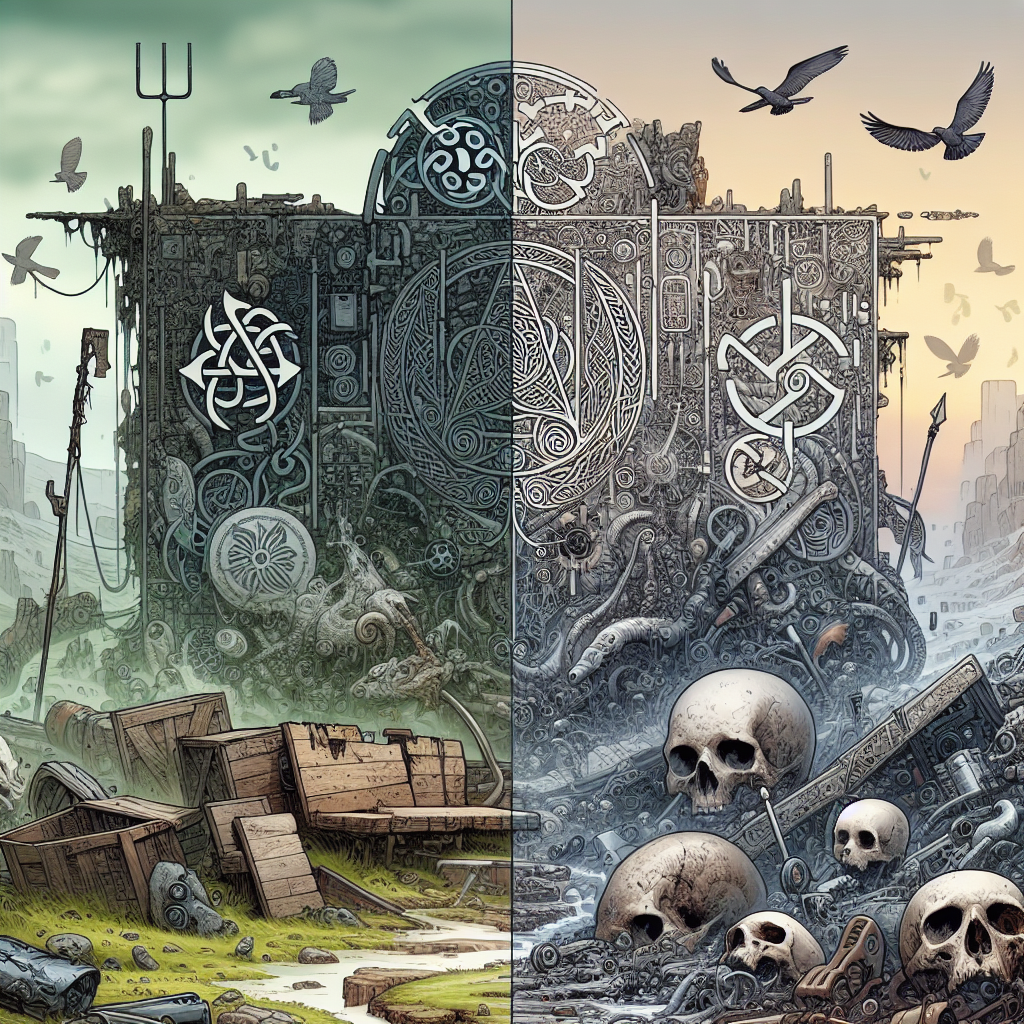In religious contexts, the concepts of Rapture and Ascension hold distinct meanings and implications. Rapture is the prophesied event in Christianity where believers are suddenly removed from Earth either before the Tribulation or at the second coming of Jesus Christ. On the other hand, Ascension refers to the holiday that commemorates Jesus’ ascent into heaven 40 days after Easter.
Rapture is often associated with prophecies like Judgment Day and the Second Coming of Christ, while Ascension focuses on Jesus being raised into heaven by God after his resurrection from death. However, the concept of Ascension extends beyond this singular event and encompasses the integration of higher selves or souls into physical bodies, allowing individuals to consciously connect with their divine nature while living on Earth.
The ascension process involves living in and expanding from the heart, awakening to our divine nature, and consciously uniting our spirits with our bodies. In the past, renouncing the body and physical world was often seen as part of the path to enlightenment. However, the current understanding of ascension emphasizes integrating inward and consciously living as spirits in bodies.
Through this process, individuals can experience unity consciousness, recognizing the interconnectedness of all beings in indescribable ways. While the collective consciousness often resides in fear, individuals have the power to choose love, peace, and unity as the driving forces in their lives.
Furthermore, the concept of rapture can also be extended to animals. The rapture of animals would serve as a conviction against humanity for their exploitation and mistreatment of animals. It would demonstrate that God views animals as more godly than those who harm them. God’s plan for animals may involve a similar rapture experience, where their rising into heaven would be witnessed by people as a testimony against those who live in corrupt ways.
Overall, rapture, ascension, and godly living are interconnected in religious teachings. As peacemaking children of God, we can participate in freeing creation from corruption by feeling the pain and suffering of animals, refusing to consume or use animal products, and bearing witness to God’s heavenly will in a corrupt world.
Key Takeaways:
- Rapture refers to the sudden removal of Christian believers from Earth before the Tribulation or at the second coming of Jesus Christ.
- Ascension is the holiday that celebrates Jesus’ ascent into heaven 40 days after Easter.
- Ascension involves integrating higher selves or souls into physical bodies, allowing individuals to consciously connect with their divine nature.
- Rapture is associated with prophecies like Judgment Day and the Second Coming of Christ, while Ascension focuses on Jesus’ resurrection and ascension into heaven.
- The ascension process emphasizes integrating inward and consciously living as spirits in bodies, instead of renouncing the body and physical world.
- Through ascension, individuals can experience unity consciousness and choose love, peace, and unity as guiding principles.
- The concept of rapture can be extended to animals, where their rapture would serve as a testimony against those who exploit and mistreat them.
Understanding Rapture
Rapture, as understood in Christian theology, refers to the prophesied sudden removal of Christian believers from Earth before the Tribulation or at the second coming of Jesus Christ. It is a concept that has been the subject of much debate and interpretation within different Christian sects.
In many Christian beliefs, the Rapture is closely associated with prophecies like Judgment Day and the Second Coming of Christ. It is believed that during this event, true believers will be taken up to heaven, escaping the trials and tribulations that will befall those who are left behind on Earth.
The idea of the Rapture has gained significant attention and interest in recent years, with many books and movies exploring the possibilities and implications of this event. However, it is important to note that not all Christians subscribe to the idea of the Rapture, and interpretations of biblical prophecies can vary widely.
| Rapture | Ascension |
|---|---|
| Believers taken up to heaven | Jesus ascending to heaven |
| Escape from Tribulation | Celebration of Jesus’ resurrection |
| Associated with Second Coming of Christ | Connected to the integration of higher selves |
| Subject of debate and interpretation | Signifies conscious living as spirits in bodies |
While the concept of the Rapture focuses on the removal of believers from Earth, the idea of Ascension is centered around Jesus’ ascension into heaven after his resurrection. Ascension is celebrated as a holiday 40 days after Easter and carries a different significance in religious observance.
From a spiritual perspective, Ascension also refers to the process of integrating the higher selves or souls into physical bodies. It is seen as a way for individuals to consciously connect with their divine nature while still living on Earth. This notion emphasizes the importance of embracing and manifesting our true selves, rather than renouncing the physical world as was often believed in the past.
“As we consciously unite our spirits with our bodies, we also experience unity consciousness, where we are interconnected in indescribable ways.”
Living as Spirits in Bodies
The shift in understanding the ascension process is significant. It is now about integrating inward and consciously living as spirits in bodies. By doing so, we not only awaken to our divine nature but also experience unity consciousness, where we recognize our interconnectedness with one another and the world around us.
While the concept of the Rapture is often focused on human believers, it can also be extended to animals. The idea that the rapture of animals would serve as a testimony against those who exploit and mistreat them suggests that God values the well-being of all creatures. It is a reminder for humanity to treat animals with compassion and respect, recognizing their inherent divinity.
The interconnectedness of rapture, ascension, and godly living is evident in religious texts. As peacemaking children of God, we can actively participate in freeing creation from corruption. This can be achieved through compassion for animals, choosing not to consume or use animal products, and being witnesses of God’s heavenly will in a corrupt world.
Exploring Ascension
Ascension, on the other hand, is a holiday celebrating the Ascension of Jesus 40 days after Easter, symbolizing his ascent into heaven after resurrection. It holds immense significance in religious observance, as it represents the moment when Jesus, in his divine nature, returned to the realm of God. This momentous event not only solidifies Jesus’ role as the Son of God but also exemplifies the possibilities of embracing and manifesting one’s own divine nature.
The concept of ascension extends beyond Jesus’ personal experience. It is also closely connected to the process of integrating higher selves or souls into physical bodies. By actively engaging in this process, individuals can consciously connect with their own divine essence, allowing the spiritual and physical realms to merge harmoniously. Ascension, therefore, becomes a journey of awakening to our inner divinity and living in alignment with our highest selves.
Traditionally, ascension was often associated with renouncing the physical world, treating the body as mere vessel or hindrance to spiritual growth. However, the understanding of ascension has evolved over time. It is now recognized as a process of integrating inward, consciously living as spirits in bodies, and expanding from the heart. This new perspective emphasizes the importance of embracing our physical existence as a sacred part of our spiritual journey, rather than dissociating from it.
Awakening Unity Consciousness
As individuals embark on the path of ascension, they not only connect with their own divinity but also experience unity consciousness. This state of consciousness transcends the limitations of the ego and recognizes the inherent interconnectedness of all beings. It is the realization that we are all part of the same cosmic fabric, interconnected in indescribable ways.
While the collective consciousness often resides in fear and separation, individuals on the path of ascension consciously choose to align their energy and awareness with love, compassion, and unity. They understand that by embodying these qualities, they contribute to the collective awakening and the restoration of harmony on Earth.
In conclusion, ascension is a significant concept in religious discourse, marked by the celebration of Jesus’ ascent into heaven after his resurrection. It represents the integration of the divine and physical, emphasizing the importance of embracing our own divine nature. Through the process of ascension, individuals awaken unity consciousness, recognizing the interconnectedness of all beings and consciously choosing love, peace, and unity as guiding principles in their lives.
| Key Points |
|---|
| Ascension celebrates Jesus’ ascent into heaven after his resurrection. |
| It symbolizes the integration of divine and physical aspects of existence. |
| Ascension involves consciously connecting with one’s own divine nature. |
| It leads to the experience of unity consciousness and the recognition of interconnectedness. |
Ascension in Spiritual Practice
The ascension process involves consciously integrating the higher selves or souls into physical bodies, leading to an awakened state where individuals can connect with their divine nature while in the physical realm. This process is a profound spiritual journey that allows individuals to expand their consciousness, embody their true essence, and live in alignment with their highest potential. It is a path of self-discovery, transformation, and self-realization.
During the ascension process, individuals are encouraged to cultivate a deep connection with their inner selves and explore various spiritual practices that support their growth and evolution. These practices may include meditation, breathwork, energy healing, sound healing, yoga, and conscious movement. By engaging in these practices, individuals can balance their energy centers, clear energetic blockages, and raise their vibrational frequency.
Through the integration of higher selves or souls into physical bodies, individuals can awaken their dormant potential, access higher states of consciousness, and embody qualities such as love, compassion, and unity. This integration is not about escaping the physical world or renouncing the body but rather about embracing the fullness of embodied spiritual existence. It is about living consciously as spirits in bodies, honoring the sacredness of all life, and co-creating a harmonious and compassionate reality.
As individuals progress on their ascension journey and align with their divine nature, they also experience unity consciousness. This is a state of awareness where the boundaries between self and others dissolve, and a sense of interconnectedness and oneness prevails. In unity consciousness, individuals recognize that we are all interconnected and that our thoughts, emotions, and actions have a ripple effect on the collective consciousness. By choosing to align their energy and awareness with love, peace, and unity, individuals can contribute to the collective shift towards a more enlightened and compassionate world.
Table: Practices for Ascension
| Spiritual Practice | Description |
|---|---|
| Meditation | A practice that cultivates mindfulness, inner stillness, and connection with the higher self. |
| Yoga | A physical, mental, and spiritual practice that promotes harmony, balance, and unity. |
| Energy Healing | Techniques that harness and balance the body’s energy, promoting healing and spiritual growth. |
| Sound Healing | The use of sound, including instruments and vocal tones, to induce relaxation, healing, and spiritual transformation. |
| Conscious Movement | Movement practices that promote mindful embodiment, self-expression, and connection with the divine. |
“The ascension process is a sacred journey of self-discovery, transformation, and conscious living. By integrating our higher selves or souls into our physical bodies, we can awaken to our divine nature and embody love, compassion, and unity. Through spiritual practices such as meditation, yoga, and energy healing, we can raise our vibrational frequency and contribute to the collective shift towards a more enlightened and compassionate world.” – Anonymous
Rapture and Animals
The concept of rapture can also be extended to animals, serving as a testimony against those who harm and exploit them, showcasing God’s divine plan for the animal kingdom. Just as humans are believed to be lifted or taken into heaven during the rapture, animals too could experience a similar rising, testifying to their godliness and innocence.
In many religious traditions, animals are considered part of God’s creation and are valued for their inherent worth. The Bible teaches that God cares for all creatures and has a special place in His plan for animals. By extending the concept of rapture to include animals, it emphasizes the importance of treating them with love, compassion, and respect.
When we recognize the rapture of animals, it becomes evident that they are not mere commodities, but sentient beings deserving of care and protection. This understanding challenges those who exploit and mistreat animals for profit or pleasure. It acts as a powerful testimony against cruelty and serves as a reminder that God’s plan for animals goes beyond their earthly existence.
| Key Points | Summary |
|---|---|
| The concept of rapture can be extended to animals. | Animals can experience a rising, testifying to their godliness. |
| Animals are part of God’s creation and have inherent worth. | They deserve love, compassion, and respect. |
| The rapture of animals challenges exploitation and cruelty. | It showcases God’s divine plan for the animal kingdom. |
Animal Rights and Rapture
Understanding the concept of rapture in relation to animals also raises important questions about their rights. If animals are considered part of God’s plan and can potentially experience a rapture-like event, it highlights the need to advocate for their well-being and protection.
Advocating for animal rights aligns with the teachings of compassion, stewardship, and justice found in many religious traditions. It calls us to recognize the inherent value of animals and to take responsibility for their welfare. This includes advocating for laws and policies that protect animals from harm, ensuring their habitats are preserved, and promoting ethical treatment in industries that use animals for food, clothing, or entertainment.
- Animal rights are aligned with compassion and justice.
- Advocacy includes promoting ethical treatment and protecting habitats.
- Laws and policies should protect animals from harm.
By embracing the concept of rapture for animals and supporting their rights, we can contribute to a more compassionate and harmonious world. It is an opportunity to reflect on our own actions and choices, considering how we can align ourselves with God’s divine plan for His creation.
Conclusion
In conclusion, Rapture and Ascension differ in their contexts and implications, with Rapture tied to Christian prophecies and the Second Coming of Christ, while Ascension symbolizes Jesus’ ascent into heaven and offers a path for individuals to embrace their divine nature while on Earth.
The concept of Rapture, often dismissed by Christian sects, is associated with prophecies such as Judgment Day and the Second Coming of Christ. It refers to the prophesied sudden removal of Christian believers from Earth before the Tribulation or at the second coming of Jesus Christ.
On the other hand, Ascension celebrates the event where Jesus was raised into heaven by God after his resurrection from death. It holds significance in religious observance and is observed 40 days after Easter. Ascension is also related to the process of integrating higher selves or souls into physical bodies, allowing individuals to consciously connect with their divine nature while on Earth.
The ascension process involves living in and expanding from the heart, where individuals consciously united their spirits with their bodies. It signifies a shift from the past, where renouncing the body and physical world was often seen as part of the path to enlightenment. The current understanding of ascension focuses on integrating inward and consciously living as spirits in bodies.
Furthermore, the ascension process leads to the experience of unity consciousness, where individuals recognize their interconnectedness in indescribable ways. While the collective consciousness predominantly resides in fear, individuals have the choice to align their energy and awareness with love, peace, and unity.
In addition to humans, the concept of rapture can also be extended to animals. The rapture of animals would serve as a conviction against those who exploit and mistreat them, showing that God considers animals to be more Godly than those who harm them. This illustrates God’s plan for animals, suggesting that they may experience a similar rising into heaven as a testimony against those who live corrupt lives.
As peacemaking children of God, individuals can participate in freeing creation from corruption by feeling the pain and suffering of animals, refusing to consume or use animal products, and being witnesses of God’s heavenly will in a corrupt world.
FAQ
What is the difference between Rapture and Ascension?
Rapture refers to the sudden removal of Christian believers from Earth before the Tribulation or at the second coming of Jesus Christ, while Ascension is a holiday celebrating the Ascension of Jesus 40 days after Easter.
What is Rapture associated with in Christian sects?
Rapture is often dismissed by Christian sects and is associated with prophecies like Judgment Day and the Second Coming of Christ.
What does Ascension refer to?
Ascension refers to Jesus being raised into heaven by God after his resurrection from death. It is also related to the process of integrating higher selves or souls into physical bodies, allowing individuals to consciously connect with their divine nature while on Earth.
How is Ascension different from past beliefs?
Ascension is different from the past, where renouncing the body and physical world was seen as part of the path to enlightenment. The ascension process now involves integrating inward and consciously living as spirits in bodies.
What is unity consciousness in relation to Ascension?
As we consciously unite our spirits with our bodies, we also experience unity consciousness, where we are interconnected in indescribable ways.
How does the concept of rapture extend to animals?
The concept of rapture can also be extended to animals, where the rapture of animals would convict humanity for their exploitation and mistreatment of animals. It would show that God considers animals to be more Godly than those who harm them.
What does the rapture of animals signify?
The rapture of animals would serve as a testimony against those who live in corrupt ways and a testament to God’s plan for animals.



